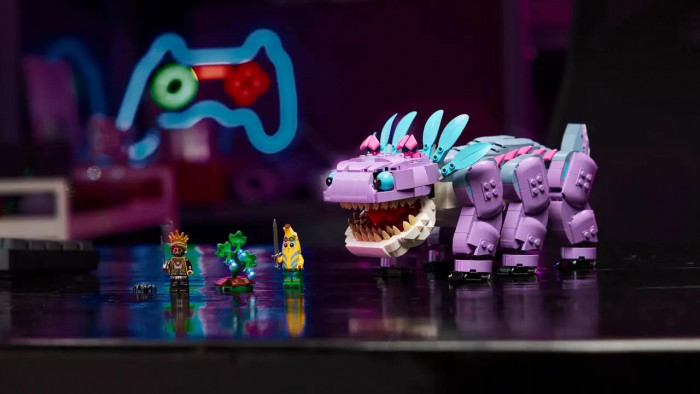It makes sense to start with the blood. When you think of the hazards associated with a night at a critically acclaimed West End play – boiling hot rooms seemingly designed to aid unplanned naps, noisy crisp-eaters in the audience, unseemly scrums at the bar for interval gin and tonics – being sprayed with the red stuff, or a realistic approximation of it, probably doesn’t rank that highly. This is very much not the case in a Jamie Lloyd production.
Last year, one of the many notable aspects of the 34-year-old theatre impresario’s hit adaptation of Richard III was a grisly on-stage death that all but necessitated splash-proof ponchos for a large portion of the audience. Surprisingly, this shriek-inducing gore came from a commitment to realism.
“I had this notion that Buckingham would be killed by having his jugular sliced,” explains Lloyd with a smile. “If you’re going to do something like that, you can’t have a little bit of blood. It f*cking spurts out, and keeps on spurting. So we came up with this mechanism – all this tubing that was built into the actor’s shirt, which could be pumped. Then when we got into the space we realised it was hitting three or four rows in the auditorium, and I thought, ‘Well, there’s not a lot I can do about it now.’”
So did it annoy people, this unexpected messy interactivity? “There was one woman who had a particularly expensive cashmere coat on, which had to be paid for,” says Lloyd, that mischievous smile deepening. “But other people came in white T-shirts and wanted to get covered in blood as a souvenir. It became this ‘thing’. For me, that’s exciting.”As Lloyd wraps up another subversive success and eyes more ways to entertain, inform and, let’s be honest, provoke the crowds, it becomes clear: blood-stained clothing is just the start.

Fast and Furious
Even if you don’t know his name (which is very likely), you’ve almost certainly heard about Lloyd’s productions. From the stage version of The Commitments to the awful-named-but-really-quite-good musical satire Urinetown, he’s had a hand in hit productions that play at the edges of what a tourist-pleasing Theatreland hit can be or do or say. However, it’s his attention-grabbing work at the Trafalgar Studios – noisy, slickly marketed triumphs including Martin Freeman in that despotic Shakespearean bloodbath and James McAvoy in both Macbeth and now The Ruling Class – that have truly caught the eye.
With this in mind, the London theatre seems an apt place to meet. Lloyd – compact, sharply dressed, sporting a shaved head and craft brewer’s beard – ushers me inside and leads me to the surprisingly huge and, it should be said, pretty grotty space under the stage, as his assistant takes the understudies through rehearsal above our heads.
“It was always a notoriously problematic space,” says Lloyd, settling on a sofa next to a rail of costumes and some half-finished mugs of tea. “One of the first things we did was raise the stage by two metres. Before, it was like you were looking at the actors down a well.”
It wasn’t just cosmetics that fell under Lloyd’s exacting eye. Raised in Devon and a stranger to theatre until his late teens, he was determined to bring in the theatre-phobic and shake off the stuffy image of “some bloke in baggy tights and a ruff talking in a language you don’t understand”. He implemented £15 tickets on Mondays, targeted at schoolkids and people of limited means. He also appropriated the language of film and video games – “fast and furious” staging, interesting star signings and, yes, so many buckets of fake blood he gets a discount from his supplier – passionate to reach a new audience and prove plays aren’t just for the privileged.
“You can’t sit back and expect first-time theatre-goers to show up,” he says. “You have to inspire them. Theatre can seem elitist and snobby; a dusty, forbidding place where you go to scratch your chin. Moving beyond that has been a key factor of what we do. You can be populist or commercial and still be intellectually challenging.”
Class Warrior
Signs of Lloyd’s war on elitism can certainly be found in his latest critical hit at the Trafalgar Studios. Written in 1968 by Peter Barnes, The Ruling Class is a riotous satirical acid trip about a young aristocrat and Tory lord who emerges from a mental breakdown convinced that he is the reincarnation of God. It has song and dance numbers, men in drag, a marauding giant hamster, brutal gags at the expense of the establishment and, whirling at the centre of it all, James McAvoy giving the performance of his career as the troubled would-be Earl Of Gurney.
For Lloyd (who, post-Macbeth, had been looking for another project to do with McAvoy) the temptation to do something so provocative and political proved too strong.
“We’re down the road from Downing Street and round the corner from Buckingham Palace, so there’s a political dimension to the work,” he says, leading me up on to the actual stage. “Pursuit of power and profit, manipulation of the weak; you want to hold up a mirror to the insanity of the world. I sent James the play, and he hadn’t heard of it, but he loved it, and the idea of doing it in the run up to a general election seemed apposite.”

Spitting Distance
Lloyd shows me just how close the first row now is to the stage (“If you’re lucky, you might get some McAvoy saliva,” he laughs) and we settle down in the auditorium. The Ruling Class is approaching the home straight of its run, so Lloyd’s mind is already on future projects.
He’s in discussions for another season at the Trafalgar, and is intrigued by the idea of a scripted immersive piece outside of a traditional theatre space, plus some possible screen work with McAvoy. One proposition he’s no longer involved with, however, is the mooted musical adaptation of Back To The Future.
“I pulled out of that,” he says, with an intense look. “I wanted to do something leftfield with a bit of unusual theatricality – we had practised making cars fly without any wires – and not just do a wholesale recreation of the film. Let’s just say there was an amicable disagreement about the direction it was heading in.”
Lloyd, it’s clear, is not one to compromise his vision. Or waste time on something he’s not passionate about. With our interview nearly finished, I want to find out about his other passions. How does he kick back when he’s not dripping blood on the cashmere of the theatrical establishment?
“I’m a bit of a tattoo collector,” he says, pulling up his sleeves to show me the intricate scrollwork on his arms. “There’s something weirdly therapeutic about getting a tattoo, and tattooists are such great craftsmen. But you also leave it to chance, and I quite like that.” Before I mention it, he has, of course, made the connection. “It’s a little bit like the theatre, I suppose,” he says. “You need that element of risk.”
Click here for your last chance to get tickets to the show
Latest
Related Reviews and Shortlists










